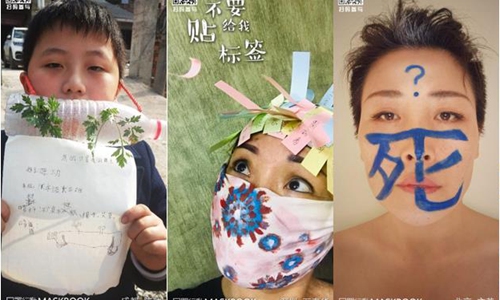HOME >> ARTS
Face mask art project inspires creative release amid COVID-19
By Bi Mengying Source:Global Times Published: 2020/3/13 12:52:47

Photo: Courtesy of Windowfish
Protection from air pollution to preventing diseases from spreading, face masks have taken on new meaning since the coronavirus COVID-19 outbreak. And face masks now play a role in the art world.
Maskbook, a project initially launched to raise awareness on air pollution and climate change, has been reinvigorated.
Ahead of the 2015 UN Climate Change Conference in Paris, Beijing-based artist, Wen Fang proposed the idea in 2014, inviting the public to express their creativity by creating individual face masks. During the conference, Wen's idea was turned into a sideline exhibition held at Grand Palais in the French capital. By the end of 2016, the project had attracted thousands of participants from over 40 countries and regions.
Following the COVID-19 outbreak, Wen relaunched her project with three female artists, Ma Yue, Néowenn, and Yiting who are now asking the public to create face masks and share their personal stories. The female artists belong to Windowfish, an artist collective dedicated to reconnecting art with the public, posted ALAB, a Chinese cultural organization on its WeChat blog (a popular Chinese social media platform) a week ago.
"I learnt about this project by chance and instantly reached out to Windowfish. I hope that with our joint efforts we can invite more people, including the female readers of ALAB to join in and pass on such a healing project," said Wang Wei, CEO of ALAB.
Action and courage
The project's initial significance lies in the public's transformation from fear and self-protection against the air pollution to contemplation and taking responsibility, Wen explained. The renewed project includes those who have shown bravery amid the outbreak and their reflections on the experience.
"Can making a face mask change reality? Yes. Because it is at this moment that we are no longer waiting; we are taking action," Wen told the Global Times.
In explaining why taking action matters, Yiting shared how some of her friends asked for her opinions on the face masks designs they wanted to create. She'd usually suggest they try to make them first.
"More often than usual, what they eventually create is different from how they thought the face masks would be when they first started. The mind and action are separate. Action can help reduce the noise in your mind, and give people true courage," Yiting said.
Building connections
The art project has brought people together amid the epidemic. By sharing work and contemplating together, participants do not feel as lonely.
Néowenn said they had received collaborations from families, such as face masks made by mother and daughter pairs for their pets to let children know that face masks not only protect people but also nature.
"An acquaintance of mine not only took part in making a face mask but offered to help produce a video for the project. I thanked her and told her we couldn't pay her. She didn't mind and shared her personal story of traveling the world and volunteering in Morocco as a disabled person. I almost cried and thought about my friends who were just like her," said Wen.
The connections developed through the project were made possible due to the project's accessibility. Participants, both young and old have the opportunity to express themselves and connect with others, Wen explained.
Healing the heart
"The healing process of making the face masks is like adding more energy to one's spirit and strengthening their mental immune system," said Ma when discussing the art project's therapeutic aspects.
Dubbed it as a form of spiritual quarantine and internal dialogue, Yiting noted the project provides the opportunity to deal with one's emotions, trauma, or wishes, which have been buried in their hearts but evoked by the epidemic.
"Such feelings tend to be ignored in our routine life," Yiting said.
At the height of the epidemic, Wen began to reflect upon death. "If I died this year, would I have any regrets?" she asked herself while making a mask with this theme. Upon completion, she felt relieved as she could face the question without fear.
As more people join the project, the artists have experienced many emotional moments.
"When my friend, who works as a designer, sent me his work that he made for Maskbook, I knew then he had found his means of catharsis," said Wen.
Her friend's face mask featured a quote by the English poet George Gordon Byron. "If I should meet thee after long years, how should I greet thee? With silence and tears."
Newspaper headline: Chinese artists begin COVID-19 dialogue
Posted in: CULTURE & LEISURE